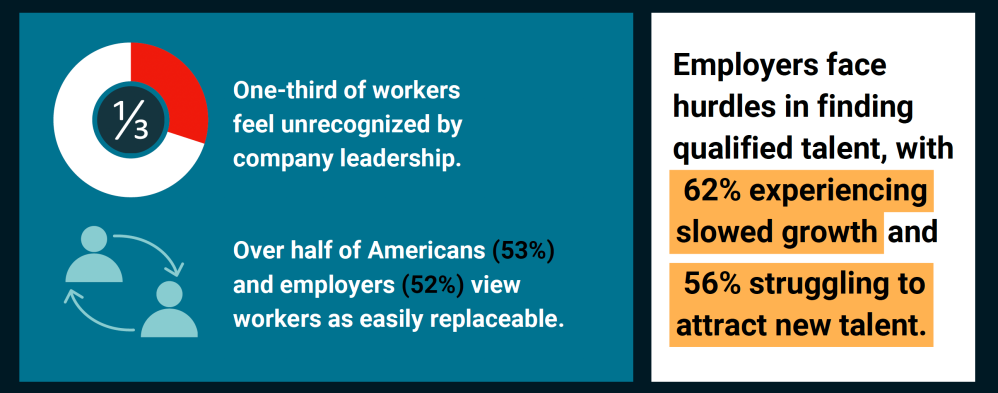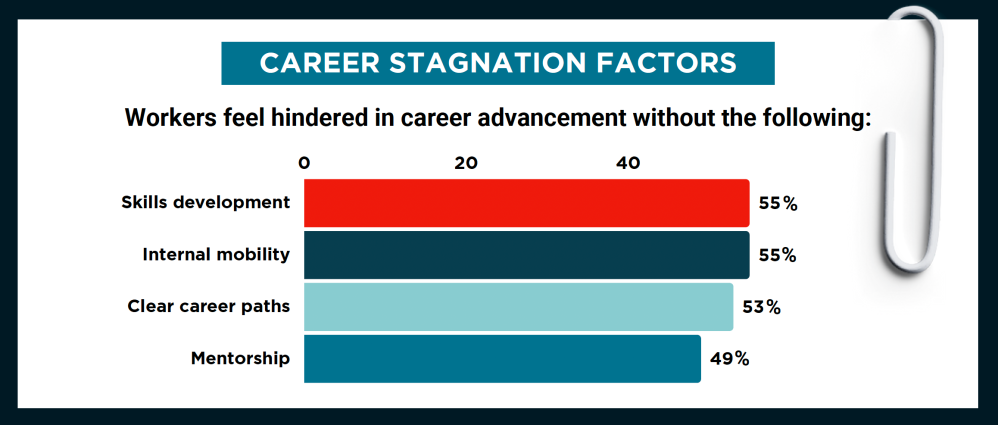Following a year of sweeping layoffs and notable strikes, like those in the entertainment and auto industries, the so-called Great Resignation has become what some are dubbing a Great Talent Stagnation. According to new research, U.S. employers are reporting a lack of qualified applicants, while workers are reporting a dearth of internal opportunities for promotion.
On Wednesday, The University of Phoenix Career Institute put out its fourth annual Career Optimism Index, which shows that many American workers aren’t seeing room for advancement at their jobs. At the same time, their research shows that when hiring, employers are looking externally for a perfect match that doesn’t seem to exist.
The authors of the report claim that by recruiting externally, employers are disregarding potential within their existing workforce, frustrating many workers.
“As U.S. companies cut jobs and reduce expenses, they are fixating on the next best thing available to them outside of their organization to drive growth. This perspective is perpetuating a stagnant talent environment,” explained John Woods, Provost and Chief Academic Officer at the University of Phoenix.
A majority (53%) of Americans have expressed feeling that they could be easily replaced in their roles, and nearly two thirds (64%) say their employers do not offer opportunities for internal movement. Meanwhile, 44% of employers say their greatest obstacle in finding talent is a lack of qualified candidates.

2023 was a difficult year for workers, and 42% say they’re concerned about losing their job, 38% say their pay has not kept up with inflation, and 42% say they can afford less today than they could two years ago. Almost one third of employees (30%) report that they don’t feel recognized for their input, and 27% do not feel empowered in their current job.
While 62% of employers claim their company offers chances for internal mobility, only 36% of workers agree, and despite 90% of employers saying their company provides opportunities for career progression, only 69% of workers agree.
The University of Phoenix report indicates that workers are interested in learning new skills to stay ahead (74%), and that if their company did more to upskill (66%) and reskill (65%) them, and gave them chances to employ these new competencies (69%), they would be more inclined to stay.
Even with this stagnation, workers are optimistic, with 78% hopeful about the future of their career and 72% feeling they have control over their professional future.
But the index, which surveyed more than 5,000 U.S. adults who are currently working or would like to be, alongside 501 U.S. employers, shows there is opportunity for employers to capitalize on worker optimism
Nearly two-thirds of employers (62%) say hiring has slowed over the past year. Only 19% believe they’ll have more than 50 new hires in 2024, down from 25% in 2023. More than half (51%) say that in the past year, it took thirty days or more to fill an opening at their organization, and 44% report the greatest roadblock was a lack of well-qualified external candidates.
The study shows that employers can actually grow the necessary talent from within, and that there are meaningful financial upsides to doing so.

As a first step, employers should make their employees more aware of opportunities for internal growth. Workers who knew of opportunities for internal mobility (82%), as well as those who had conversations with their manager about their career progression (86%), visibility with upper management/leadership (88%), networking opportunities (86%), and mentoring in their careers (87%) report high levels of job satisfaction.
Employers should also be flexible about how workers learn new proficiencies, and how they employ them. Forty percent of workers– nearly half– would rather learn on their own, whether by reading, personal projects, or online videos and tutorials. Workers who have the latitude to determine what they work on at their job are more satisfied than those who don’t have that freedom (86% vs. 66%), and 78% of workers believe they accomplish more at their job when they have flexibility.
This year’s Career Optimism Index included for the first time statistical modeling illustrating that U.S. businesses and organizations could see cumulative cost savings of up to $1.35 trillion if they adjust to solve talent stagnation.
Employers who put resources toward low-cost, high-impact tools for employees to reach their career goals including career pathing, skilling, and mentorship can save up to $6,521 through boosted productivity, $916 through reduced turnover, and $616 through diminished healthcare costs per employee per year.
Workers, on the other hand, can add up to $5,270 to their salary by investing in their own career pathing, skilling, and mentorship.
“Our Career Optimism Index illustrates that business leaders are overlooking the immense potential of the workforce within their own organizations, who remain resilient and optimistic despite the macro environment. These workers possess a significant desire to advance and acquire the skillsets employers are seeking to fortify their businesses for the future,” Woods concluded.
TMX contributed to this story.


